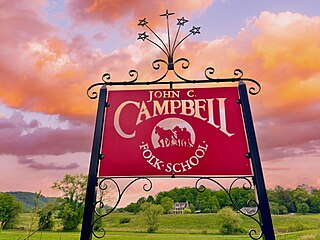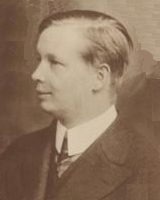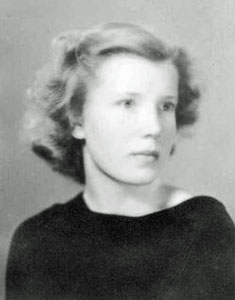Early years
The idea for the festival came to John Blakemore after a local musician suggested holding a Fourth of July fiddler's contest on Whitetop Mountain. [3] Blakemore mentioned it to his cousin, John Buchanan, who told his wife, Annabel. Annabel Buchanan, a musician and music teacher, had been putting on small music programs around Marion, Virginia, for several years. She discussed the idea with her friend, classical composer John Powell. Blakemore, Buchanan, and Powell began planning for a music festival that included more than the original idea of a fiddler's contest. They decided that they would consider only "old time" music and disallowed "modern songs, tunes, or dances." [3] The first festival was scheduled for August 15, 1931.
The inaugural White Top Folk Festival drew around 3,000 spectators and hosted around three dozen musicians and groups. The musicians competed for monetary prizes, which were especially attractive during the Depression days. [3] The 1932 festival was similar in format but slightly larger and stretched over two days. It included handicraft exhibits, square dances, and a winner's program. Nearly 4,000 people attended to watch over 75 individual and group performers.

William Smith Monroe was an American mandolinist, singer, and songwriter who created the bluegrass music genre. Because of this, he is often called the "Father of Bluegrass".

Grayson County is a county located in the southwestern part of the Commonwealth of Virginia. As of the 2020 census, the population was 15,333. Its county seat is Independence. Mount Rogers, the state's highest peak at 5,729 feet (1,746 m), is in Grayson County.
Virginia's musical contribution to American culture has been diverse, and includes Piedmont blues, jazz, folk, brass, hip-hop, and rock and roll bands, as well as the founding origins of country music in the Bristol sessions by Appalachian Virginians.

Old-time music is a genre of North American folk music. It developed along with various North American folk dances, such as square dancing, contra dance, clogging, and buck dancing. It is played on acoustic instruments, generally centering on a combination of fiddle and plucked string instruments, most often the banjo, guitar, and mandolin. Together, they form an ensemble called the string band, which along with the simple banjo–fiddle duet have historically been the most common configurations to play old-time music. The genre is considered a precursor to modern country music.

West Virginia's folk heritage is a part of the Appalachian folk music tradition, and includes styles of fiddling, ballad singing, and other styles that draw on Ulster-Scots music.

Whitetop Mountain is the second highest independent mountain in the U.S. state of Virginia, after nearby Mount Rogers. It is also the third highest named peak in Virginia, after Mount Rogers and its subsidiary peak, Pine Mountain. It is located at the juncture of Grayson, Smyth, and Washington Counties, and is also within the Mount Rogers National Recreation Area of the Jefferson National Forest. Whitetop was the location of the White Top Folk Festival from 1932 to 1939, with the exception of 1937. Like nearby Mount Rogers, it represents an ecological "island" of flora and fauna commonly found much farther north than Virginia, such as old growth red spruce and other northern softwoods.
The American Folk Blues Festival was a music festival that toured Europe as an annual event for several years beginning in 1962. It introduced audiences in Europe, including the UK, to leading blues performers of the day such as Muddy Waters, Howlin' Wolf, John Lee Hooker and Sonny Boy Williamson, most of whom had never previously performed outside the US. The tours attracted substantial media coverage, including TV shows, and contributed to the growth of the audience for blues music in Europe.

Appalachian music is the music of the region of Appalachia in the Eastern United States. Traditional Appalachian music is derived from various influences, including the ballads, hymns and fiddle music of the British Isles, and to a lesser extent the music of Continental Europe.

The John C. Campbell Folk School, also referred to as "The Folk School", is located in Brasstown, North Carolina. It is the oldest and largest folk school in the United States. It is a non-profit adult educational organization based on non-competitive learning. The Folk School offers classes year-round in over fifty subject areas including art, craft, music, dance, and nature studies. Established in 1925, the Folk School's motto is "I sing behind the plow".

Clarence "Tom" Ashley was an American musician and singer, who played the clawhammer banjo and the guitar. He began performing at medicine shows in the Southern Appalachian region as early as 1911, and gained initial fame during the late 1920s as both a solo recording artist and as a member of various string bands. After his "rediscovery" during the folk revival of the 1960s, Ashley spent the last years of his life playing at folk music concerts, including appearances at Carnegie Hall in New York and at the Newport Folk Festival in Rhode Island.
Melvin Wine was an American Appalachian fiddler from the state of West Virginia. He was a lifelong resident of Copen, in Braxton County, West Virginia.

Jim & Jesse were an American bluegrass music duo of brothers, Jim McReynolds and Jesse McReynolds. They were born and raised in Carfax, a community near Coeburn, Virginia, United States.
Jean Bell Thomas was an American photographer and folk festival promoter, who specialized in the music, crafts, and language patterns of the Appalachian region of the United States.
Hobart Smith was an American old-time musician. He was most notable for his appearance with his sister Texas Gladden on a series of Library of Congress recordings in the 1940s and his later appearances at various festivals during the folk music revival of the 1960s. Smith is often remembered for his virtuosic performances on the banjo, and had also mastered various other instruments, including the fiddle, guitar, piano, harmonica, accordion and organ.
"Cumberland Gap" is an Appalachian folk song that likely dates to the latter half of the 19th century and was first recorded in 1924. The song is typically played on banjo or fiddle, and well-known versions of the song include instrumental versions as well as versions with lyrics. A version of the song appeared in the 1934 book, American Ballads and Folk Songs, by folk song collector John Lomax. Woody Guthrie recorded a version of the song at his Folkways sessions in the mid-1940s, and the song saw a resurgence in popularity with the rise of bluegrass and the American folk music revival in the 1950s. In 1957, the British musician Lonnie Donegan had a No. 1 UK hit with a skiffle version of "Cumberland Gap".

John Powell was an American pianist, ethnomusicologist and composer. Along with Annabel Morris Buchanan, he helped found the White Top Folk Festival, which promoted music of the people in the Appalachian Mountains. A firm believer in segregation and white supremacy, Powell also helped found the Anglo-Saxon Clubs of America, which soon had numerous posts in Virginia. He contributed to the drafting and passage of the Racial Integrity Act of 1924, which institutionalized the one-drop rule by classifying as black (colored) anyone with African ancestry.

John Preston Buchanan was an American politician who served as a member of the Virginia Senate, representing the state's 1st district.

Daniel Shane Knicely, known as Danny Knicely, is an American country and bluegrass musician. In addition to singing, he plays guitar, fiddle, and mandolin. His album releases include: The Evenin' News, Chop, Shred & Split, Waltz for Aimee, The Melody Lingers, Roots and Branches, and Murders, Drownings and Lost Loves (2006) — which he recorded with Will Lee.
Donald DePoy is an American bluegrass musician, music educator, and music event organizer. He is a fifth-generation bluegrass musician from the Shenandoah Valley and a multi-instrumentalist. He and his wife Martha Hills have performed as the duo Me & Martha since 2005. He is founder of the Shenandoah Music Trail and the first "bluegrass church". He won first place in dulcimer at the 2017 Old Fiddlers' Convention in Galax, Virginia.

Annabel Morris Buchanan was an American composer and folklorist. The author of the book Folk Hymns of America (1938) as well as myriad journal articles, Buchanan helped found the White Top Folk Festival, which promoted music of the people in the Appalachian Mountains. Buchanan's documenting practices are credited for preserving many folk songs that might have otherwise gone on unrecorded.














